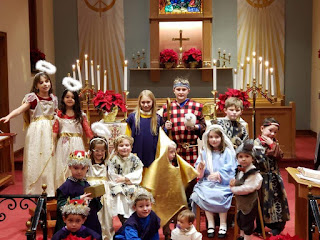St. Luke’s Church, Philipsburg, NJ
The Rev. Anne E. Kitch
Christmas Eve 2019
 |
| St. Luke's Pageant 2019 |
Are you ready for Christmas? Our fabulous parish administrator
and bookkeeper asked me this on Saturday as we were reviewing bulletins one last
time. I think it surprised her when I said, Yes. “That’s because I have let go of five things,”
I told her. This is my secret—I am never going to be ready for Christmas, so at
some point I stop trying and let the messiness be what it is.
Christmas is difficult. Christmas is glorious. Christmas is stressful.
Christmas is about family or food or festivities. Or grief, or loneliness, or
lostness. Or Jesus.
Christmas is about all these things, because Jesus is about
all these things. There is no joy or trouble where we can be that Jesus is not.
That’s the whole point. That’s the whole point of Jesus being fully human as
well as fully divine, of the Word becoming flesh, of the Incarnation—the embodiment
of God in frail humanity.
Jesus, being fully human, had a fully human birth. And this doesn’t
only mean that our audacious God put the salvation of humankind into the hands
of two very vulnerable human beings who were first-time parents of a newborn. Even
before that, God had to count on both Mary and Joseph saying, yes. The
salvation of the world depended on their faithfulness.
And while our gospels are full of what made this a Holy night—in
Luke ‘s version we get angels choirs, in Matthew’s version we get a sacred star—what
they don’t tell is the ordinary stuff that our pageant and Christmas cards and
classic works of art leave out. Actually, a Christmas card with cheery snowmen on
it may get close to being right, because the birth of Jesus was in mnay ways ordinary.
Mary and Joseph were set apart…and they were not. To begin
with, they were not the only ones traveling to Bethlehem at that time. There
was a government census that required everyone in Judea to travel back to their
hometown in order to be registered. Everyone. So all those adult children who had
created lives for themselves in some other city were on their way home. Mary and
Joseph likely traveled with a caravan on the roads from Nazareth to Bethlehem, a
journey of 90 miles up and down hilly country, and Mary was surely not the only
pregnant woman around. I imagine her receiving advice and comfort from older women
who had given birth before. Nor were they the only couple trying to find a place
to stay in a small city that was full of travelers.
And the manger was not in a stable outback somewhere, but in
a room of a family home where animals were kept nearby. And Mary, surrounded no
doubt by friendly beasts, surely also had the help of a local midwife and the
women in the family.
In other words, it was about community.
The extraordinary were there too, but the heavenly host of angels
were not by the manger but rather shining all their glory on some shepherds out
in the wilderness beyond town, doing the ordinary business of watching their
flocks. They’re the ones who are told the Messiah is born and they hurry off to
Bethlehem to see for themselves, finding Mary and Joseph and the baby, and
telling them and all else who are there and anyone who would listen what they
had learned from the angels. And everyone marvels at what the shepherd tell. But Mary treasured all these
words and pondered them in her heart.
And by the way, the magi are not in Luke’s story at all. They
show up in the gospel of Matthew and not on the night when Jesus was born, but
perhaps even a year later when Jesus was a young child (we hear that story on
Epiphany, January 6th).
So our manger scenes and our Christmas pageants get it wrong…and
get so much right. In fact, our pageant
this afternoon was exactly the kind of ordinary, loving, somewhat messy community
which embodies the love of Jesus.
When we gather together, we are both human and holy. This is
what it means to be a church, to be a community of God. It is to travel together,
to become companions, to find places for those who are lost or lonely or hurting.
To laugh and play together, to help one another, to gather together to get through
hard times and to celebrate new life.
We don’t always get it right. But we are here tonight in
part because we are all reaching for something more and we know that doing it
together helps. Faithful walking is not the same thing as perfect fulfillment. Faithfulness
includes striving and forgiveness and acceptance and renewal.
One of my favorite carols is In the Bleak Midwinter, especially
verse 4:
What can I give him, poor as I am,
if I were a
shepherd, I would bring a lamb.
If I were a
wise man, I would do my part;
yet what I
can I give him, give my heart
What can we give to Jesus, what can we give to each other, is
what we can—ourselves. Welcome to the messiness of Christmas. Welcome to the
glory. Welcome to one another.